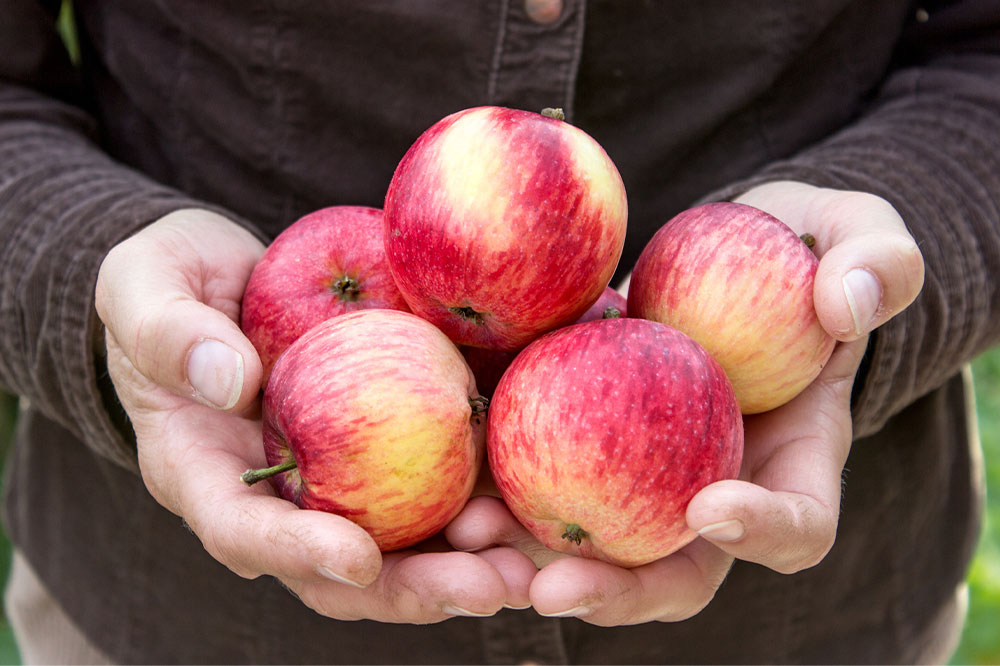12 Foods That Can Improve Lung Health

When it comes to maintaining optimal lung health, lifestyle and nutrition can play a crucial role. Adding certain foods to daily meals can help strengthen the lungs, improve respiratory function, and reduce the risk of lung-related ailments. Further, when dealing with respiratory conditions, food can aid exercise, treatment, and healthy lifestyle changes in strengthening the lungs. So, one should choose from the following nutrient-rich foods that are known to have positive effects on lung health.
Apples
Apples are known to help fight diseases. But what makes the fruit such an excellent addition? Quercetin is an antioxidant found in high quantities in apples. Antioxidants help improve lung function and overall health, keeping the body up and running. Another benefit of adding apples to daily meals is that the fruit helps the lungs recover from infections and diseases.
Beets
Beet is one of the best foods to strengthen the lungs. It also helps regulate blood pressure and assists in increasing oxygen intake. Loaded with minerals and nutrients, including nitrates, beetroot can help vessels relax, thus increasing oxygen uptake. Beet can be added to meals, side dishes, or salads. Recipes like hummus can also use beetroot to enhance their flavor and color.
Pumpkins
Pumpkins are a fall favorite. But apart from being great ingredients for snacks and beverages, pumpkins are great for health. They contain carotenoids that help reduce inflammation and the risk of lung cancer. One can also add pumpkin seeds to daily meals to boost magnesium, the lack of which can affect lung function. Roasted pumpkin seeds make for great mid-day snacks. Pumpkins also contain vitamins C and E and beta carotene, which can help improve the immune system.
Tomatoes
Tomatoes are loaded with lycopene—a strong antioxidant that is known to help fight respiratory conditions. Adding a single tomato to the daily meal plan can help reduce the risk of inflammation in the airways and a decline in lung health. One can add tomatoes to salads, curries, sandwiches, or pizza, as it is a versatile ingredient found in every kitchen.
Turmeric
Turmeric offers many health benefits, including improving lung health. The spice contains a compound called curcumin which is known to fight inflammation and damage to the lungs. It is often added to tea or hot water, along with daily meals, to fight bouts of common cold and flu. However, it can also serve as a preventative measure to strengthen the lungs. Its anti-inflammatory and anti-viral properties make it capable of keeping diseases and infections at bay. Turmeric can be used in its fresh, powdered, or grated forms. One can also get supplements containing the spice. It is a great addition to savory and sweet recipes, milk, and tea. One can add some ground black pepper to turmeric recipes to boost the effectiveness of the spice.
Edamame
Studies suggest that foods rich in isoflavones have been associated with a lower risk of developing COPD (chronic obstructive pulmonary disease) and other respiratory illnesses. Edamamde is one the most easily available foods that contain a high amount of isoflavones. It helps improve lung function and relieves wheezing and shortness of breath.
Licorice
Licorice root tea, supplements, or herbal beverages are known to improve respiratory and cardiac health. Although research is yet to establish the exact link, licorice is associated with improved lung function, reduced risk of heart disease, and better management of lung cancer symptoms.
Coffee
Many people with asthma consider coffee a powerful drink that can relieve their symptoms. As many as two cups of coffee in a day can significantly relieve asthma symptoms and strengthen the lungs. Caffeine can be a mild bronchodilator, an effect that lasts for a while, up to 4 hours, after having a cup of coffee. So, it can improve airway function temporarily.
Peppers
Vitamin C is one of the most powerful antioxidants that also happens to be easily available in common foods. Peppers also contain high levels of this antioxidant. For those with compromised respiratory systems, it is important to increase the vitamin C intake to maintain optimal function. Further, those who are constantly exposed to pollutants that weaken the respiratory system should increase vitamin C intake to fight the effects of such irritants and improve lung health.
Grapes
Fruits that are rich in water content, along with essential vitamins and minerals, are great for the lungs. Grapes are one such fruit that contains disease-fighting antioxidants and are known to improve lung health and fight inflammation in nasal passages. According to the American Lung Association, getting a good balance of protein, carbohydrates, and fresh fruits and vegetables can help one improve lung and digestive health.
Nuts
Another healthy option to deal with cravings is nuts or seeds. Packed with healthy fats and some vital minerals, nuts provide the body with essential nutrients and energy needed for proper functioning. For example, walnuts contain magnesium which can strengthen the lung muscles and omega-3 fatty acids that fight inflammation in the organs.
Berries
Berries are among the healthiest foods to add to daily meals. Full of vitamins and minerals, the bright, juicy treats are rich in flavonoids—antioxidants that can free radical damage in the lungs. They also exhibit anti-inflammatory properties and can relieve symptoms of various lung diseases like asthma, COPD, and more. So, one should add blueberries and strawberries to daily meals to improve lung health.
By making better food choices and adopting healthy habits, one can improve lung function and lower the risk of respiratory illnesses. Further, decreasing exposure to pollutants, allergens, and irritants can help one keep infections at bay. However, one should consult a doctor or a licensed nutritionist before making drastic changes to daily meals to avoid developing a deficiency of essential nutrients.






